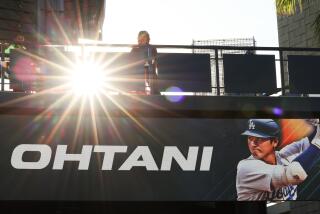Good Samaritan Law Benefits Players, Protects Doctors
- Share via
A fondness for football and devotion to the community might draw physicians to the sidelines, but they are unpaid for a more compelling reason.
Zero compensation equals full protection.
A state law enacted in 1978 following the death of an Agoura High player protects physicians from liability for civil damages provided they receive no compensation for time spent at games.
Michael Hollander, unpaid team physician at Reseda, would appear to be protected from damages resulting from the death of Eric Hoggatt, a Reseda running back who died in his sleep Thursday night after playing in a game against Chatsworth.
Hollander, an orthopedist, kept Hoggatt out of the game after the player complained of dizziness. No one has suggested that the physician acted improperly, although Hoggatt’s relatives voiced displeasure that no one from Reseda informed them after the game of the young man’s injuries.
The 1978 legislation was prompted by the efforts of Howard Cole, whose son, Greg, died as the result of injuries suffered while playing for Agoura in 1977.
Cole, a 6-foot-3, 220-pound senior, injured his head trying to tackle Channel Islands running back Toa Saipale late in a game in November 1977. No physician was present.
“[Cole’s] head caught Toa’s thigh in mid-stride and it spun [Cole’s] head so violently, like a [twisting] action,” said Joel Gershon, the Channel Islands coach the past 23 years.
Cole wobbled to the sidelines, fell and went into convulsions. He was operated on the next day and died at St. John’s Medical Center in Oxnard three days after the game.
“They had a trainer [at the game], but no doctor, although everyone agreed it would have made no difference in Greg’s case,” said Frank Greminger, the Agoura coach at the time.
Before the legislation, many doctors were unwilling to serve as team physicians because they worried about leaving themselves open to lawsuits.
Howard Cole, since deceased, was an attorney, and he brought the situation to the attention of the state legislature. One year after his son’s death, the law was passed protecting physicians who donate their time at high school athletic events.
“The father was coming from the right place, not trying for personal gain,” Gershon said. “As a result of his son’s loss, some good came of it.”
The law protects physicians who, “in good faith and without compensation,” render voluntary emergency medical assistance to a participant in a school athletic event.
Team physicians have a name for it.
“We operate under what we call the good Samaritan law,” said Mel Hayashi, for 23 years the Newbury Park team physician. “You help anyone at the time of injury, you are not liable.”
Gross negligence is not covered by the statute.
“If you do something wrong, if you suspect a neck injury and turn [the player] over inadequately, then you might be liable,” Hayashi said.
The California Interscholastic Federation does not require a physician at games, although several coaches contacted erroneously believe this to be the case. However, many leagues require the home team to provide a physician.
Mike Herrington, in his eighth year as Hart coach, could recall only one occasion when a doctor wasn’t present--last season when the Indians played at Compton Dominguez in the second round of the Southern Section Division II playoffs.
When officials discovered no doctor was available to treat an injured player, they held up the game until a doctor could be found. The obliging fan, a Hart booster, was a gynecologist.
Other schools make quality medical care a top priority. Westlake’s team doctor, orthopedic surgeon Dennis Sakai, has attended home and away games for 17 years. The team also has a chiropractor, Scott Blatt, at all of its games.
“If a player comes out, [Sakai] has to clear him,” Coach Jim Benkert said. “He’s been doing this a long time. I trust him totally.”
For the physician who donates his Friday nights each fall, the best game is one he can simply enjoy from the sidelines without having to treat a player.
“Something like [Hoggatt’s death] doesn’t happen often, thankfully,” Hayashi said. “Everyone feels so sorry. It’s a disaster for everybody. My heart aches.”
The sorrow extends to the opposing team. Chatsworth players were dismayed Friday upon learning of Hoggatt’s death.
“We feel pain for Reseda because they lost a good friend,” said Vince Hernandez, a Chatsworth lineman. “He took a couple of hits, but it’s part of the game.
Although no one disputes the physical nature of football, life-threatening injuries are rare. Hayashi has seen one player collapse on the field in 23 years, and the player recovered.
There is no telling how many lives have been saved by the law protecting unpaid team physicians.
“There is no way to eliminate all risk of injury in football,” Gershon said. “Having medical personnel on the sidelines is a great precaution.”
Contributing: Paige A. Leech.
More to Read
Get our high school sports newsletter
Prep Rally is devoted to the SoCal high school sports experience, bringing you scores, stories and a behind-the-scenes look at what makes prep sports so popular.
You may occasionally receive promotional content from the Los Angeles Times.







